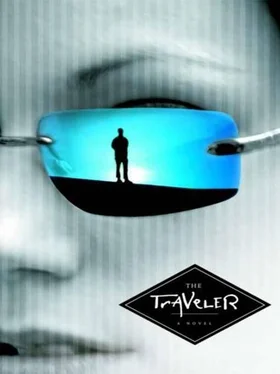“Who am I?”
Nathan Boone looked down at Michael as the private jet headed east over the squares and rectangles of Iowa farmland. Before they left Long Beach Airport, the young man appeared to be sleeping. Now his face was slack and unresponsive. Perhaps the drugs were too strong, Boone thought. There could be permanent brain damage.
He swiveled around in the leather seat and faced the physician sitting behind him. Dr. Potterfield was just another mercenary, but he kept acting like he had special privileges. Boone enjoyed ordering him around.
“Check the patient’s vital signs.”
“I did that fifteen minutes ago.”
“Do it again.”
Dr. Potterfield knelt beside the stretcher, touched Michael’s carotid artery, and took his pulse. He listened to Michael’s heart and lungs, pulled back his eyelid and studied the iris. “I wouldn’t recommend keeping him under for another day. His pulse is strong, but his breathing is getting shallow.”
Boone glanced at his watch. “What about four more hours? It’ll take us that long to land in New York and get him to the research center.”
“Four hours won’t change anything.”
“I expect you to be there when he wakes up,” Boone said. “And if there’s any problem, I’m sure you’ll be glad to take full responsibility.”
Potterfield’s hands trembled slightly as he took a digital thermometer out of his black bag and slipped the sensor into Michael’s ear. “There won’t be any long-term problems, but don’t expect him to climb a mountain right away. This is just like recovering from general anesthesia. The patient is going to be confused and weak.”
Boone swiveled back to the small table in the middle of the plane. He was annoyed that he had to leave Los Angeles. One of his employees, a young man named Dennis Prichett, had interviewed the injured motorcycle riders who chased after Gabriel Corrigan. It was clear that Maya had acquired allies and captured the young man. The team in Los Angeles needed direction, but Boone’s instructions were clear. The Crossover Project had highest priority. The moment he obtained control of either of the brothers, Boone was supposed to personally escort him back to New York.
He had spent most of the flight using his computer to search for Maya. All these efforts were channeled through the Brethren’s Internet monitoring center located in an underground site in central London.
Privacy had become a convenient fiction. Kennard Nash once lectured on that subject to a group of Evergreen Foundation employees. The new electronic monitoring had changed society; it was as if everyone had been moved into a traditional Japanese house with interior walls constructed of bamboo and paper. Although you could hear people sneezing, talking, and making love, the social assumption was that you shouldn’t pay attention to it. You had to pretend the walls were solid and soundproof. People felt the same way when they walked past a surveillance camera or used a cell phone. These days the authorities were using special X-ray machines at Heathrow Airport that could see through passengers’ clothes. It was disturbing to realize that different organizations were watching you, listening to your conversations, and tracking your purchases-so most people pretended that it wasn’t true.
Government officials who supported the Brethren had provided access codes to crucial databases. The largest source was the Total Information Awareness system, established by the American government after the passage of the United States Patriot Act. The TIA database was designed to process and analyze every computer-connected transaction in the country. Whenever a person used a credit card, checked out a library book, transferred money overseas, or went on a trip, the information was entered into the centralized database. A few libertarians objected to this intrusion, so the government transferred control of the program to the intelligence community and changed its name to the Terrorism Information Awareness system. Once the word “Total” was replaced by the word “Terrorism,” all the criticism stopped.
Other countries were passing new security laws and setting up their own versions of TIA. In addition, a variety of privately owned companies were collecting and selling personal information. If the Tabula employees at the computer center in London couldn’t obtain the access codes, they had software programs called Peephole, Hacksaw, and Sledgehammer that allowed them to break through firewalls and enter every database in the world.
Boone felt that the most promising weapons in the battle against the Brethren’s enemies were the new computational immunology programs. The CI programs had originally been developed to monitor the Royal Mail’s computer system in England. The Brethren’s programs were even more powerful. They treated the entire Internet as if it were an enormous human body. The programs acted like electronic lymphocytes that targeted dangerous ideas and information.
During the last few years, CI programs had been released onto the Internet by the Brethren’s computer team. The self-contained programs wandered unnoticed through thousands of computer systems. Sometimes they lingered like a lymphocyte in a person’s home computer, waiting for an infectious idea to appear. If they found something suspicious, the program would return to the host computer in London for further instructions.
The Brethren scientists were also experimenting with a new interactive program that could actually punish the Brethren’s enemies, like a cluster of white blood cells dealing with an infection. The CI program identified people who mentioned the Travelers or the Harlequins in their Internet communications. Once that was done, the program automatically placed a data-destroying virus in the owner’s computer. A small proportion of the most dangerous computer viruses on the Internet had been created by the Brethren or their government allies. It was easy to place the blame on a seventeen-year-old computer hacker living in Poland.
Maya had been tracked down using both computational immunology and a conventional data scan. Three days earlier, the Harlequin had entered an automobile parts warehouse and killed some mercenaries. When Maya fled the area, she’d either had to walk, get a ride from someone, buy a car, or find public transportation. The computer center in London had sorted through Los Angeles police reports involving a young woman in the target area. When that wasn’t successful, they entered taxi company computer systems to discover what passengers hired cabs during the four-hour period after the murders. These pickup and drop-off addresses were matched against information obtained by the CI programs. The central computer had the names and addresses of thousands of people who might help the Travelers or the Harlequins.
Five years ago, the Brethren’s psychological evaluation team had plugged into the computers of the shopping clubs run by American grocery stores. Whenever a person bought something and used their discount card, the purchases were entered into a general database. During the initial study, the Brethren’s psychologists attempted to match a person’s food and alcohol consumption with their political affiliation. Boone had seen some of the statistical correlations and they were fascinating. Women living in northern California who bought more than three kinds of mustard were usually political liberals. Men who bought expensive bottled beer in East Texas were usually conservative. With a home address and data from a minimum of two hundred grocery-store purchases, the psychological evaluation team could accurately predict a person’s attitude toward a mandatory citizen ID card.
Boone found it interesting to see what kind of people resisted social discipline and order. Opposition sometimes came from antitechnology tree huggers who ate organic food and shunned the factory food manufactured by the Vast Machine. But equally troublesome groups were organized by the high-technology freaks that ate candy bars for dinner and searched the Internet for rumors about the Travelers.
Читать дальше












